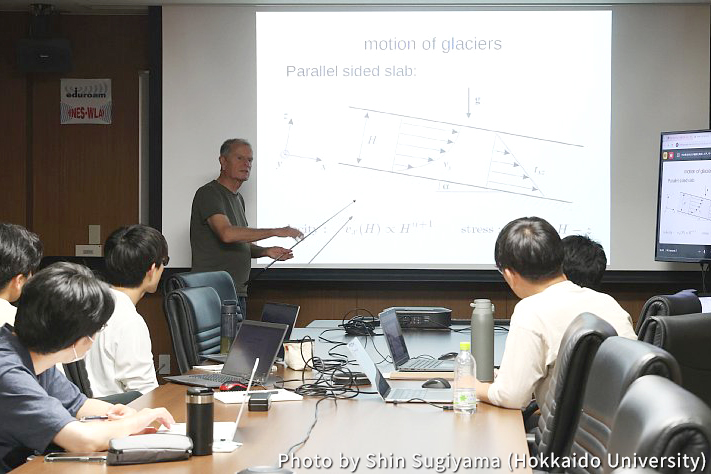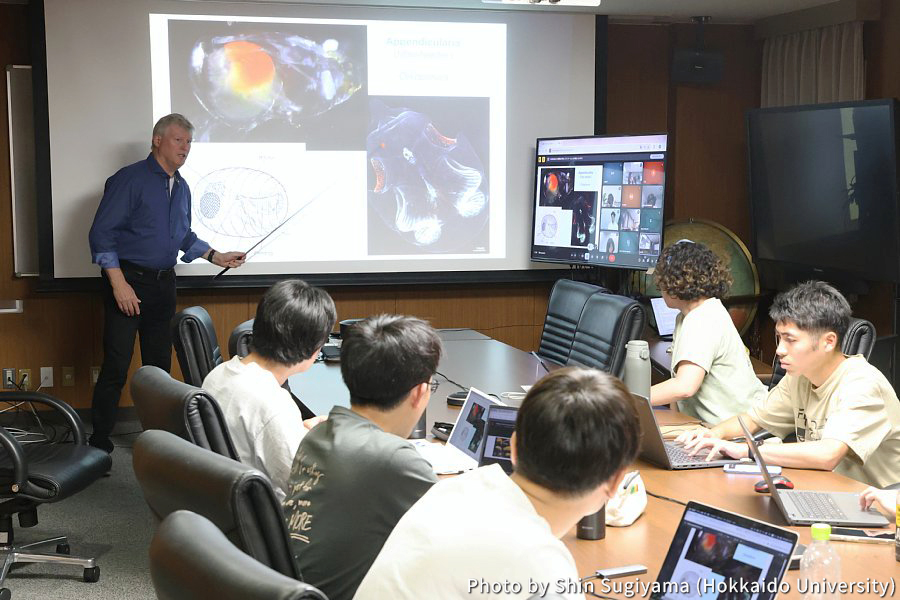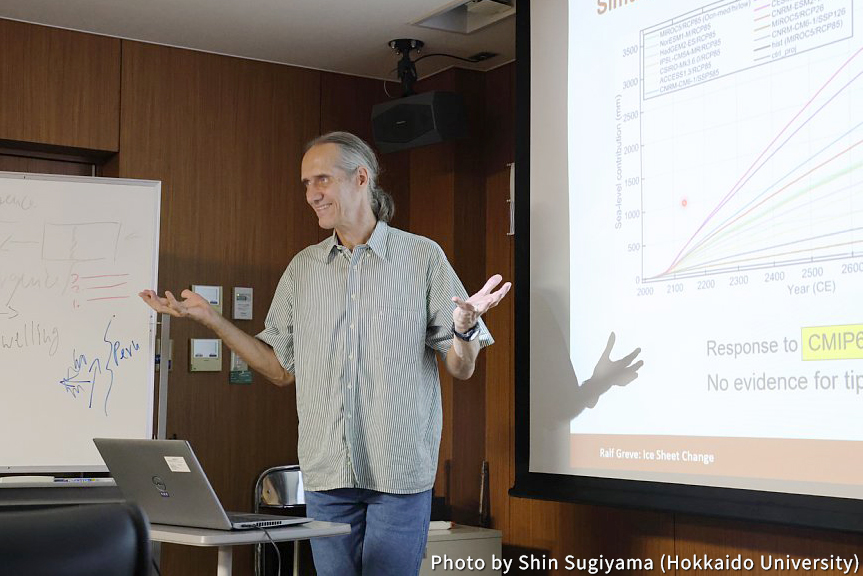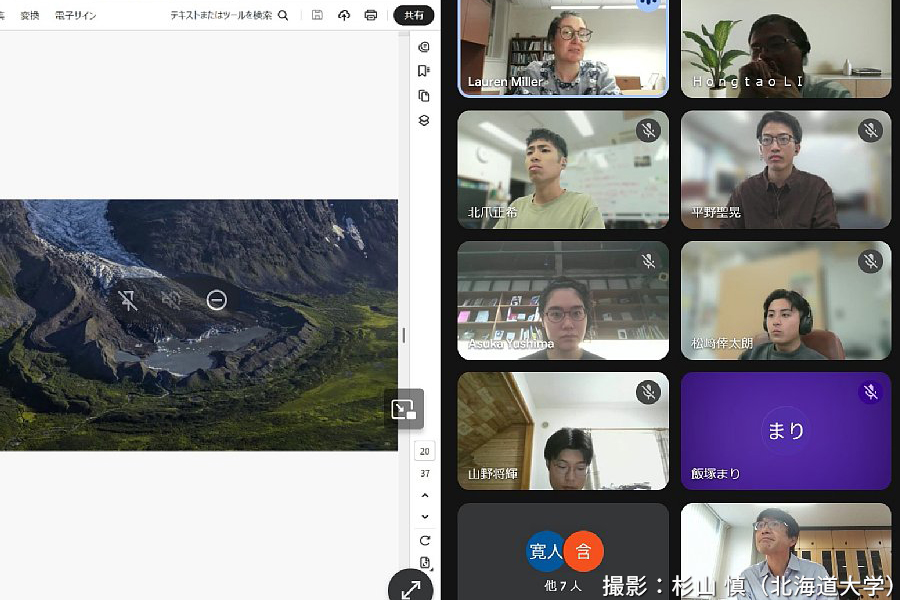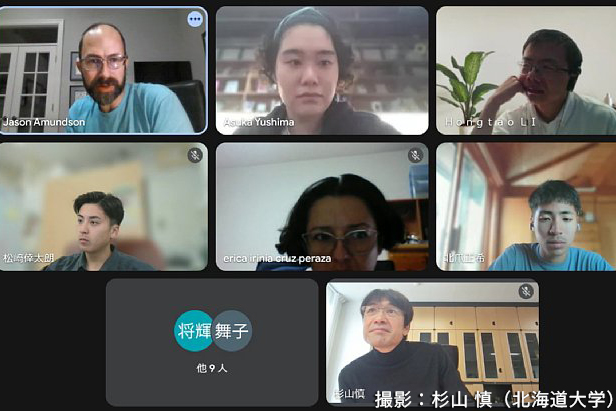| Messages from Participants |
- I learned about this program from my supervising professor, and decided to enroll because my research theme focuses on marine mammals in Greenland, which is part of the Arctic region. Studying on my own tends to make me focus too much on biology, but in this program, I was able to engage with areas I wouldn’t normally encounter, such as sea ice, glaciers, and even plankton, which allowed me to gain a broader perspective. I was most impressed by the lecture on Antarctic and Arctic biology by Prof. Wilhelm Hagen, which was easy to understand and fascinating for someone like me specializing in biology. It was such a very valuable learning opportunity that allowed me to deepen my understanding of my research field. (Sara Kim, 1st-year Master’s student, Department of Biological Sciences, Graduate School of Science, Kyoto University)
- “I learned about the “Special Lecture on Arctic and Antarctic Science II” through an email from the National Institute of Informatics. I joined because I have always been interested in polar science and wanted to gain insights from leading researchers. The course was very well organized, and even online, the interaction with lecturers was smooth and engaging. My favorite lectures were by Professor Wilhelm Hagen and Professor Heinz Blatter, who were humorous and clear in their explanations. I especially enjoyed learning about albedo feedback and ice–snow dynamics, which helped me better understand climate processes. Although my research field is informatics, the lectures inspired me to explore interdisciplinary links between AI and polar studies. I truly appreciated the opportunity and hope to join similar programs on-site in the future.” (Zirui Wang, 1st-year Master’s student, SOKENDAI)
- I was most impressed by the lecture on the cryosphere. I found the mass balance of glacier and ice sheet models, ice flow models, and the climate system where ice sheets, the atmosphere, and the ocean interact with each other to be most interesting. I felt that the major changes occurring in glaciers and ice sheets were due to global warming. I found how this would affect the climate system and sea level rise, was major issue that need to be researched in the future. In the seminar classes where students made presentations, it helped me to understand the contents better. I was able to learn about a variety of topics from other students’ presentations. (Shoichi Shinmura, 1st year master’s student, Chiba University)
- I am researching underwater robots in graduate school. During my research, I learned about the existence of underwater robots operating in polar regions. I was interested in the kind of data biological and environmental researchers are looking for and the objectives when operating robots in such extreme environments as polar regions, so I decided to take this course. The lectures were mainly about biological and environmental topics, and as an engineering student, it was all I had never heard of before. Not only was it outside my area of expertise, but I was unfamiliar with the English vocabulary for biological and environmental topics, so I listened to the lectures while looking up the meanings of the words. I felt I was able to acquire basic knowledge about the polar environment (Ayato Ishikawa, 2nd year master’s student, Tokyo University of Marine Science and Technology).
- I learned about this program through information from the URA staff at the university. I am developing a technology to directly measure the extremely small heat emission from single cells. I participated in the program to explore new insights and potential applications by examining in detail the metabolic heat of microorganisms living in polar regions. Through the course, I learned the amount of ice varies significantly throughout the year and that glaciers play an important role in stabilizing the Earth’s climate and maintaining ecosystems. I was also able to understand the conditions under the polar food chain. This very meaningful experience surely broadened the perspective of my future research (Ren Umeno, Graduate School of Engineering, Kyushu Institute of Technology, Department of Mechanical Engineering, Ph.D. student (3rd year),).
- As a student in social studies, I found it challenging to approach the field of natural sciences from a scientific perspective, but it was a very stimulating experience. In the lectures, experts from various research fields related to the Arctic gave presentations, and the overall level of content was very high, giving me the impression that the participating students had a deep understanding and knowledge. Within this context, I felt even more motivated to make greater efforts as one of the researchers studying the Arctic. Usually, I examine the Arctic Sea Routes from the perspective of international relations, but through these lectures, I was able to learn about the formation of the region, environmental changes, and future projections of ice from a scientific viewpoint. I found this knowledge extremely valuable for deepening my understanding of international agreements and policy documents, taking into account of the scientific background (Akane Sobo, 1st-year Master’s student, Graduate School of Marine Science and Technology, Tokyo University of Marine Science and Technology).
- I am currently researching extreme Arctic waves, and I felt my knowledge of the Arctic in general, which is the subject of my research, was insufficient, so I took this course. Through the course, I was able to gain a basic understanding across a wide range of fields, including ice and ecosystems. In the workshop, I learned not only about the research topics and Arctic phenomena of interest to other students, but also feedback from the instructors on my own presentation. It was a highly rewarding learning experience, allowing for interdisciplinary exchange and the acquisition of new perspectives. I hope to make extensive use of this experience in my future research (Shota Fukuda, 1st-year Master’s student, Graduate School of Frontier Sciences, The University of Tokyo).
|
 Prof. Heinz Blatter (ETH Zurich)
Prof. Heinz Blatter (ETH Zurich) Prof. Wilhelm Hagen (University of Bremen)
Prof. Wilhelm Hagen (University of Bremen) Prof. Ralf Greve (Hokkaido University)
Prof. Ralf Greve (Hokkaido University) Prof. Lauren Miller (University of Virginia)
Prof. Lauren Miller (University of Virginia) Prof. Jason Amundson (University of Alaska Southeast)
Prof. Jason Amundson (University of Alaska Southeast)

